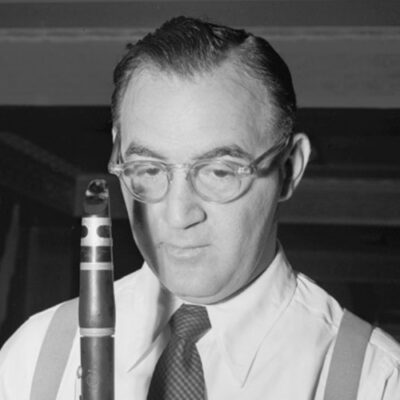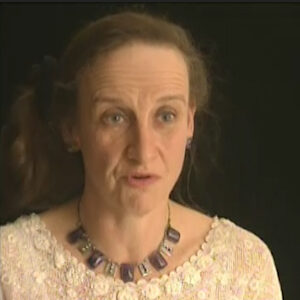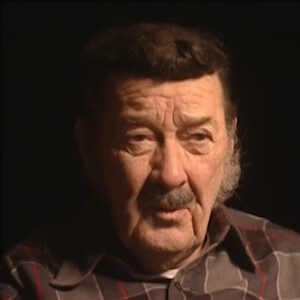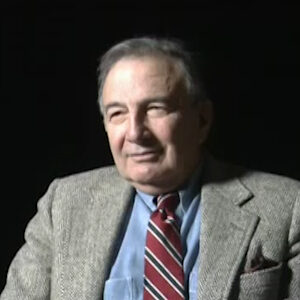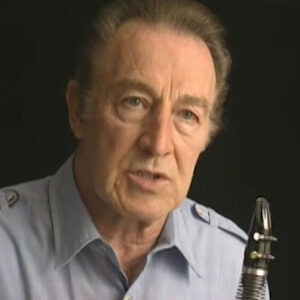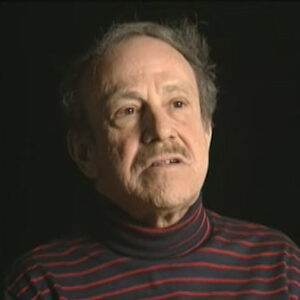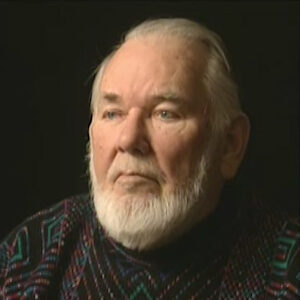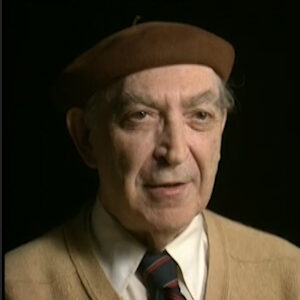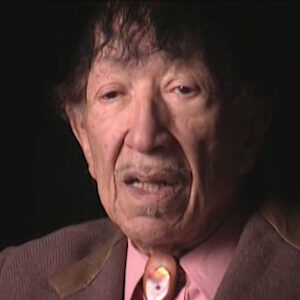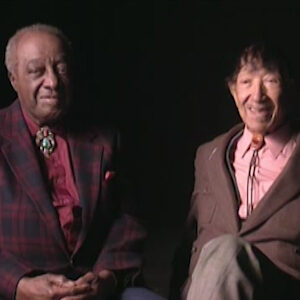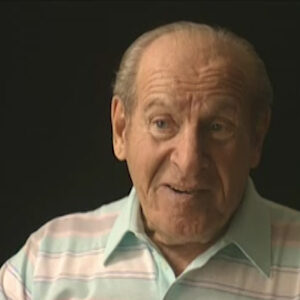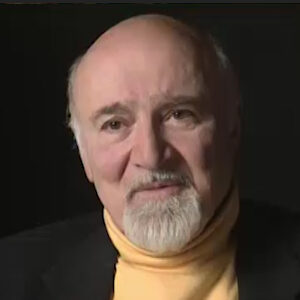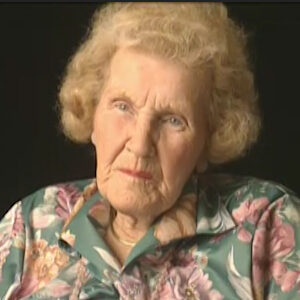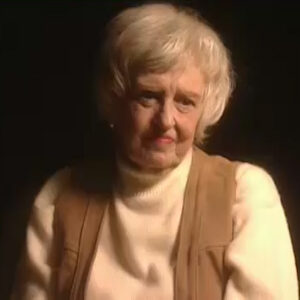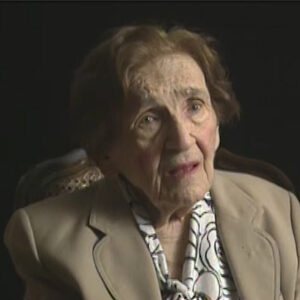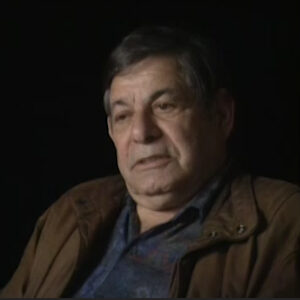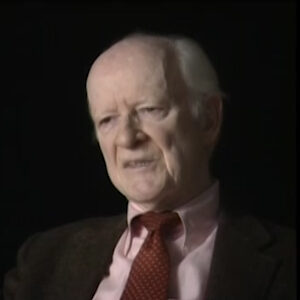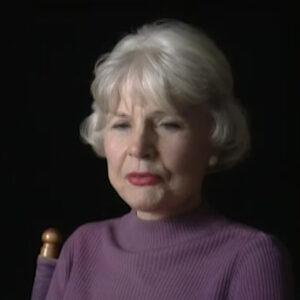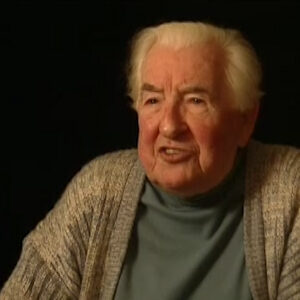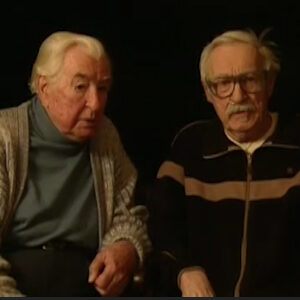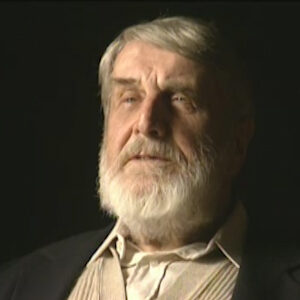Speaker And he’s playing. I mean, you said before that he was an artist, not a composer, but in the way you just described your playing as telling a story. There is a special musical quality about Benny. And, you know, they named they became associated with the word swing. Would you have anything musical to say about that?
Speaker I had a great admiration for what he was doing. And how he was doing it. After all, he made it popular to have McSpadden’s. I had to expand before, for many did, but I. Mine didn’t make the sense that many did. I mean, Bill and I found out I could ever expand in New York. Wow. That was it. Discovery. The lights went out. And from then on, I had no trouble finding musicians because I could get all kinds of musicians. I wasn’t stuck like in Chicago. Chicago didn’t do this till the 50s. Was slower here.
Speaker Explain about that, even though Teddy Wilson appeared with Benny Goodman in 36. There were they didn’t have integrated great in Chicago.
Speaker I’m sorry about that. I barely got there before me. Well, an integrated. If you say 36 because I didn’t get there now 40. Thank you. Then you could sneak around in Chicago. And you could play some dumpy joint, but stay out of them classy places. It’s like two worlds South Sciver for blacks and the whites could have the north side and the loop.
Speaker It was terrible.
Speaker And it stayed that way until the 50s. In 1950, Reg Saunders, a drummer who was also black but he had very light walked into the union, says that’s enough of this stuff. So we’ve got two unions. We should only have one. And he practically integrated. They had no answer for it. And besides, they had a fellow who was present who was amiable. So you might think even though Teddy Wilson played with Eddie, nothing changed, even though Teddy Wilson played with Benny Goodman. Nothing changed. I mean, they had their problems when they play the South. And then just. I was going to say arrogance. I’m not sure that’s the right word, but his persistence. That’s my group and that’s it.
Speaker Style of play that what struck you?
Speaker Is there anything particular if go on, talk about Benny Goodman came at a time that it was a Erard area. I mean, it was just dry. And here he comes along, starts swinging tunes. You can’t take him out of context when when you hear the other bands that were playing at it. I’m talking about the white band’s. Almost close to a Lawrence Welk sound. You got it in times. And here comes Benny with this with a swing. No, the Dorseys came also. But our time he did back to Benny was the first one. I know you added him credit. I mean, there is ring round for all of us.
Speaker Did did you notice a change after he hit it big in L.A., and then what did you hear about it? With their stories around Chicago? You know, local boy made good. Or was it a while before the impact?
Speaker It takes a while for things to get to Chicago. I mean, who was at that time especially? They told me when I came to the train to Chicago Union from the New York Union. They told me we’d do things different here. So forget what you did. New York. Or what’s going on in L.A.? This is the way we do it. And how did he do it? ISIS, you ask questions. Say, New York style was your go ahead and do it and then ask questions. Should Congress now ask questions first? And we’ll tell you if it’s OK.
Speaker So, of course, that. It cut down a lot of movement that I would have because I was a mover. But if they tell me, I can’t do thanks. I’m stuck.
Speaker That was the next contact you had with Jessan and Benny was when I just brought him in to you to try to get you to replace him.
Speaker Right. Well, then he came in 50 100 club. That’s the number how far north the club was. And he just was with them. And then Helen forced.
Speaker And they.
Speaker He sat down royally. Of course, it was a big hubbub. Many good news in our own. Tash was playing clarinet at that time.
Speaker And that.
Speaker Eventually, many got Helen forced to get up to sing with me. She says, What are you saying? She says, Oh, the blues. So I sat there and finally stopped playing the blues because I knew what he was waiting for. She was waiting for me to go, that that act, that that boom, she never got it because I was adamant. If you’re singing the blues, you don’t need that. You just sing the blues.
Speaker So then ended that quickly, though.
Speaker And tourists walked out. And, of course, I didn’t follow. Yes.
Speaker Explain that part, because that was my quote on it.
Speaker You knew he was leaving and he was looking again, just had given me my first good job. Now we came to just stay safe. Now, I came here just Stacey gave me my first good job. And now here he comes to give me another one. He was leaving Benny Goodman.
Speaker And.
Speaker He figured I was the man to take his place. Well, I took that.
Speaker Any other stories about Debbie Tough? It would help us get a sense of what a wonderful drummer he was and what a week because he explained, it’s a wonder we want to use that great story until the better Budapest. But to help set him up earlier, maybe it’s a.
Speaker If you got daily tough. And a sober cake. You’ve got a great drummer. If he didn’t jam, then he was taken either French lessons or English lessons. He was doing something with his time and playing with a band.
Speaker But the minute he got through that bandiero know he would be at the nightclub.
Speaker I can’t think of his name.
Speaker Edward Bear. Be knocking at the door.
Speaker Out of his skull, you know. But he was two kinds of persons when he laid off. He would he was able to hold on a job. When it got too boring or it said everything, he just started drinking. Yes, a story about data which comes to mind. I was working the liberty in. When you walked in there, liberties quit, but you didn’t get the part, and the drummer name was Earl Wiley, Riverboat drummer and Earl, while he was a very heavy drinker at times. And we started drinking. There was no use. He’d go to Lepanto stomach. But that he was a great drummer. And one of these nights where he started to drink, Dave Tuff was in a house. So they asked David finish up. So Dave Dave, of course, was sloshed anyway. So he’s got up on the drums and now the owner start hollering upstairs. Earl. Your substitute is drunk and you. Come on down. You could get away with in those days.
Speaker That’s kind of second, I thought that went out of my mind.
Speaker Another very well known drummer had his own band.
Speaker He was not a white drummer, black, white. My buddy Rich Buddy Rich. I couldn’t think of his name. Again.
Speaker Cooper was playing Gene Krupa, who was playing there at an engagement in Chicago. And after that, it came down to see Buddy Rich. But he said to Gene, Tell me a Benny Goodman story. And Gene says, well, you know how he looks at you. He says, When he looks at me one way, I have a feeling I shouldn’t be playing the sticks. And I changed to star snares. I changed to Russia’s.
Speaker And I got that same feeling of coming out again every quarter.
Speaker Gene Krupa was working the job, or Benny Goodman, Chicago, and after the job he went to see.
Speaker What do you want to see, buddy, start again, buddy? It’s OK. I don’t like driving either.
Speaker Gene Krupa was playing a job with Benny Goodman in Chicago, was a big job at the end engagement. He went to see Gene and Buddy Rich. He was playing at a club in Chicago, but he said to him, Tell me a Benny Goodman story. So Gene says, I tell he says when he looks at me this way and I’m playing with sticks. I know it’s time to change the brushes and I change the brushes. He looks at me this way. I know I made a mistake. I should go. Go back to Stick’s says. Very interesting.
Speaker That’s what they all say.
Speaker Never a dull moment with Benny Goodman.
Speaker Any your next encounter was when you guys played together at the whole House reunion special about that.
Speaker I will always remember that because. But Freeman was on the job. But took it on himself to introduce many. And it was just so it was so thick and rich to the point where Bene taught him how to play this saxophone. He never knew how to do it before. Not the way you’re doing it now. So when Jimmy went down and he got up to play, he looked at bat at the other end of the stage, he says, lay out this one. That’s how. So funny. A tribute. Thank you. I’m here in a high water and it tells you to lay off.
Speaker I seen. About what it was like, you know.
Speaker When Swing became suddenly was like, that was the pop music. After a few years before jazz, nobody cared. I mean, it got us a blues musician and may not have had the same.
Speaker Well, there’s one story I like to tell, and that is Chicago in 1957. I’m working with a drummer by the name of Freddy Moore. He’s colored nahm white sock. The boss signed the contract and said nothing about. But when he comes on the job and sees what’s on his stage, says, get those bums off here. Get him out. So we had to leave. We went round the corner to buy. Freddy, more drink. It’s the same bar that was owned by the same owner. But we can have a drink down in the basement. We couldn’t have a drink upstairs. It’s a picture of how it was to travel with a mixed group that started in Cincinnati. With me. Same thing, another mixed group, Buddy Smith on drums. Same thing. Would go to a railroad station and get a bite to eat. But if you sit here all night, nobody will serve you. Meanwhile, they’re playing Red Sanders Ray hit record.
Speaker What was it like? What was it like being a musician on the road? We’ll try to you know, you can’t recreate it, but we’ll try to have some shots of, you know, for most fans driving through and workshops and buses and stuff. I think. I think.
Speaker And right now I’m trying to say. Who’s the best known badly? I was black. You do can do counter. Duke Ellington explains best. Whatever was on the road, Howard was on the road. He says, you get Uganda, the coach, all the whole band, and then you come to this town where you’re going to get a bite to eat. And one guy can go to the restaurant. You don’t want all lunch and go to the room where they serve outdoor customers and given their order and get back in the bus back. Back on your train. To get to the next stop. It’s a good picture of Howard. Howard was out and we’re talking about, what, the 40s? It was Duke Ellington. I mean, how can you say that? How can you think that? But evidently there’s a lot of ignorance and not just like today.
Speaker I mean, it was it was one people happy for Teddy in Chicago and Teddy Wilson got his break and was playing this day. People appreciate. Well, here’s a big deal for this guy that he’s crossed.
Speaker Yeah, they do. Chris will be there. So put it in your own words. Whatever you.
Speaker I said before, this is one race. If you’re on color. You no doubt have one music. This was before Calypso and all that came in. So there was a tremendous understanding. And people were for you. And here’s.
Speaker Here’s a black man playing the piano. His name is Teddy Wilson, playing the piano. And.
Speaker Of course, they work so happy for him to wait outside for him. You know, it’s a different scene in going down south and where are you? Stay. Try to get a room house where blacks are welcome and then go to your own place. Which reminds me of. Time we’re now certain black was on the road, but all the action was in his room. So all you I couldn’t stay in the same hotel, you could hang out there. That’s why it was.
Speaker All right. Thanks. Thanks very much. A marvelous story. I think we came in. We’re looking at a dimension, not just the Benny Goodman story. Really understand what the music was about. I think this is a model.
Speaker Thank you so much. Appreciate it. You’re next.
Speaker Well. But as a geologist, sit still for more than we can get some warm talk. OK. Do it quietly in less than two seconds. Tony.
Speaker You look like an artist.

